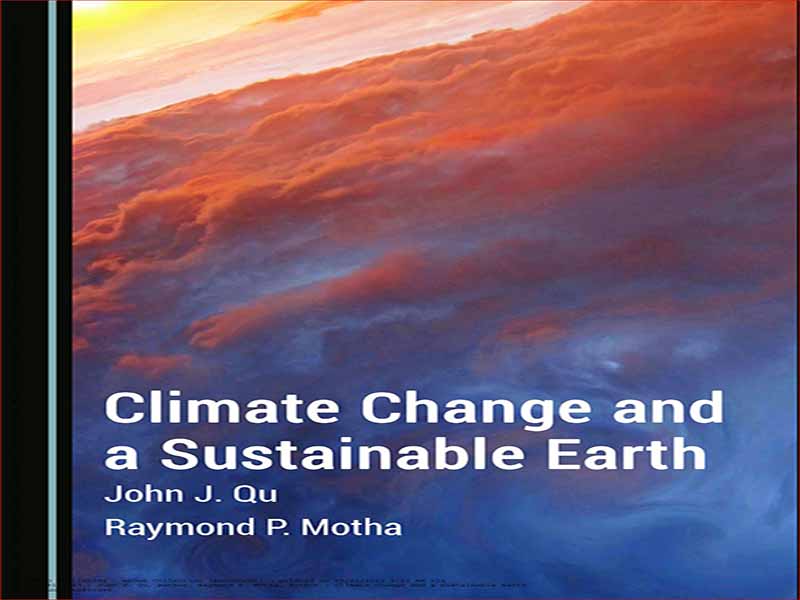- عنوان کتاب: Climate Change and a Sustainable Earth
- نویسنده: John J. Qu, Raymond P. Motha
- حوزه: تغییرات اقلیم
- سال انتشار: 2022
- تعداد صفحه: 473
- زبان اصلی: انگلیسی
- نوع فایل: pdf
- حجم فایل: 18.0 مگابایت
تغییر اقلیم یکی از چالش های بزرگ برای منابع طبیعی و قابلیت سکونت انسان در سیاره زمین است. طبق تعریف سازمان جهانی هواشناسی (WMO)، تغییرات اقلیمی به تغییرات آماری معنیداری در وضعیت میانگین آب و هوا یا در تغییرپذیری آن اشاره دارد که برای مدت طولانی (معمولاً چندین دهه یا بیشتر) ادامه مییابد. ششمین گزارش ارزیابی (AR6) هیئت بین دولتی تغییرات آب و هوایی (IPCC) با عنوان “تغییر آب و هوا 2021: مبنای علم فیزیکی” در 9 اوت 2021 منتشر شد. گزارش IPCC AR6 بر اساس آخرین درک فیزیکی از سیستم آب و هوای زمین و وضعیت فعلی آب و هوای جهان را توضیح می دهد. همچنین به احتمالات اقلیمی آینده می پردازد و پیشنهاد می کند که ما نیاز به اقدام فوری آب و هوایی برای مقابله با شرایط اضطراری تغییرات آب و هوا و کاهش انتشار گازهای گلخانه ای برای اطمینان از زمینی پایدار داشته باشیم. اقدامات تغییر اقلیم شامل تغییرات شدید دما، بارش و الگوهای باد از جمله موارد دیگر است. تغییرات اقلیمی می تواند با تغییرات ناشی از انسان ناشی از سوزاندن سوخت های فسیلی و آلودگی هوا یا تغییرات چشم انداز زمین، مانند تبدیل جنگل های ذخیره کربن به زمین های کشاورزی یا مراکز شهری مرتبط باشد. تغییرات آب و هوایی همچنین می تواند به دلایل طبیعی مانند دوره های سرد متناوب عصر یخبندان و دوره های گرم بین یخبندان رخ دهد. تغییرات آب و هوا بر سیستم زمین تأثیر می گذارد و تأثیرات آن بر منابع طبیعی یکی از بزرگترین چالش هایی است که زمین پایدار ما را تهدید می کند. سیستم زمین میتواند با چالشها و پیامدهای تغییرات انسانی و طبیعی در جو، هیدروسفر، بیوسفر و کرایوسفر سازگار شود، مشروط بر اینکه تلاشی هماهنگ بر راهحلهایی برای تخریب محیطزیست، از دست دادن تنوع زیستی و پایداری منابع متمرکز شود. یک رویکرد چند رشتهای که اصول تغییر اقلیم را با زمینههای تخصصی پیوند آب-انرژی-غذا-سلامت (WEFH) ترکیب میکند، برای بررسی نحوه عملکرد زمین به عنوان یک سیستم به هم پیوسته و یکپارچه مورد نیاز است. این کتاب درسی بر درک اصول علمی اساسی تغییر اقلیم، تعامل آنها با سیستم زمین، و تأثیرات و پیامدها بر پیوند پایداری زمین تمرکز دارد. هدف کمک به ایجاد بینشی در مورد توسعه استراتژی های بلندمدت برای مقابله با اثرات زیست محیطی، اجتماعی و اقتصادی ناشی از آن با استفاده از فناوری های نوآورانه برای پایداری آینده است.
Climate change is one of the great challenges for natural resources and human habitability on Planet Earth. According to the World Meteorological Organization (WMO), climate change refers to a statistically significant variation in either the mean state of the climate or in its variability, persisting for an extended period (typically decades or longer). The Intergovernmental Panel on Climate Change (IPCC) Sixth Assessment Report (AR6) entitled “Climate Change 2021: The Physical Science Basis” was released on 9 August 2021. The IPCC AR6 report is based on the latest physical understanding of the Earth’s climate system and explains the current state of the world’s climate. It also addresses future climate possibilities and suggests that we need to take urgent climate action to tackle climate change emergencies and to reduce greenhouse gas emissions to ensure a sustainable Earth. Measures of climate change include extreme changes in temperature, precipitation, and wind patterns among others. Climate change can be associated with human-induced changes caused by fossil fuel burning and aerosol pollution, or by alterations of the Earth’s landscape, such as transforming carbon-storing forests into farmland or urbanized centers. Climate change can also occur due to natural causes such as alternating cold periods of ice ages and warm interglacial periods. Climate change influences the Earth system, and its impacts on natural resources are among the greatest challenges that threaten our sustainable Earth. The Earth system can adapt to the challenges and consequences of anthropogenic and natural changes in the atmosphere, hydrosphere, biosphere, and cryosphere provided that a coordinated effort focuses on solutions to environmental degradation, loss of biodiversity, and resource sustainability. A multidisciplinary approach that combines the principles of changing climate with the specialized fields of the water-energy-food-health (WEFH) nexus is needed to examine how the Earth operates as an interconnected, integrated system. This textbook focuses on the understanding of basic scientific principles of climate change, their interactions with the Earth system, and the impacts and consequences on the nexus of Earth sustainability. The aim is to help provide insight into the development of long-term strategies to cope with the resulting environmental, societal, and economic impacts by utilizing innovative technologies for future sustainability.
این کتاب را میتوانید از لینک زیر بصورت رایگان دانلود کنید:
Download: Climate Change and a Sustainable Earth




































نظرات کاربران